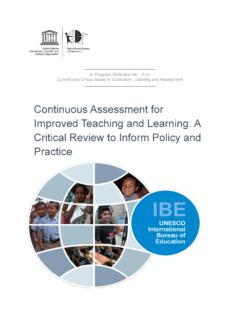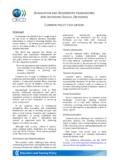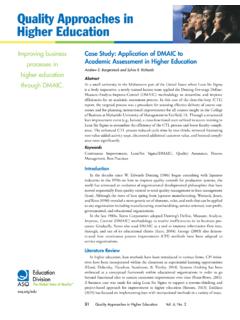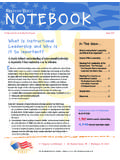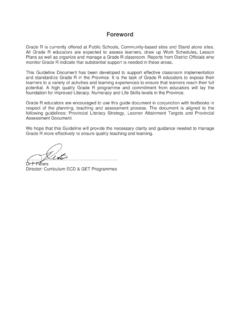Transcription of Teacher Evaluation - OECD
1 Teacher Evaluation A Conceptual Framework and examples of Country Practices DECEMBER 2009 This paper was prepared for presentation at the OECD-Mexico Workshop Towards a Teacher Evaluation Framework in Mexico: International Practices, Criteria and Mechanisms, held in Mexico City on 1-2 December 2009. It is based on work developed within the context of the OECD Review on Evaluation and assessment Frameworks for Improving School Outcomes, a project launched in late 2009. The paper is based on three pieces of work: OECD Review on Evaluation and assessment for Improving School Outcomes: Design and Implementation Plan for the Review (OECD, 2009a); Teacher Evaluation in Portugal: OECD Review (Santiago et al., 2009); Teacher Evaluation : Current Practices in OECD countries and a Literature Review (Isor , 2009). The paper was prepared by Paulo Santiago and Francisco Benavides of the OECD Secretariat.
2 TABLE OF CONTENTS -2 OECD Review on Evaluation and assessment Frameworks for Improving School Outcomes TABLE OF CONTENTS 1: INTRODUCTION .. 3 2: CONCEPTUAL FRAMEWORK TO ANALYSE Teacher Evaluation .. 3 3: DESIGN AND GOVERNANCE OF A COMPREHENSIVE FRAMEWORK FOR Teacher Evaluation .. 7 Introduction .. 7 Aims and objectives of Teacher Evaluation .. 7 Responsibilities for Teacher Evaluation .. 9 Articulation with other components of the Evaluation and assessment framework .. 10 4: Teacher Evaluation PROCEDURES .. 11 Introduction .. 11 Character and nature of Teacher Evaluation .. 12 Reference standards, aspects evaluated and Evaluation criteria .. 12 Instruments and information sources .. 14 5: COMPETENCIES FOR Teacher Evaluation AND FOR USING FEEDBACK .. 16 Introduction .. 17 Evaluators .. 17 Skill development for Evaluation .. 18 6. USE OF Evaluation RESULTS .. 18 Introduction .. 19 Formative use of results .. 19 Summative use of results.
3 19 7. IMPLEMENTATION OF Teacher Evaluation .. 20 8. CONCLUDING REMARKS .. 22 REFERENCES .. 23 APPENDIX: EXAMPLES OF COUNTRY PRACTICES .. 25 ONTARIO (CANADA), New ONTARIO (CANADA), Experienced Teacher Evaluation : A CONCEPTUAL FRAMEWORK -3 OECD Review on Evaluation and assessment Frameworks for Improving School Outcomes 1: INTRODUCTION As the most significant resource in schools, teachers are critical to raise education standards. Improving the efficiency and equity of schooling depends, in large measure, on ensuring that teachers are highly skilled, well resourced, and motivated to perform at their best. Raising teaching performance is perhaps the policy direction most likely to lead to substantial gains in student learning (OECD, 2005). In turn, the effective monitoring and Evaluation of teaching is central to the continuous improvement of the effectiveness of teaching in a school. It is essential to know the strengths of teachers and those aspects of their practice which could be further developed.
4 From this perspective, the institution of Teacher Evaluation is a vital step in the drive to improve the effectiveness of teaching and learning and raise educational standards. Meaningful Teacher Evaluation involves an accurate appraisal of the effectiveness of teaching, its strengths and areas for development, followed by feedback, coaching, support and opportunities for professional development. It is also essential to celebrate, recognise and reward the work of teachers. TALIS results reveal that the great majority of teachers report that the appraisal and feedback they receive is beneficial, fair and helpful for their development as teachers (OECD, 2009b). This paper proposes a conceptual framework to analyse Teacher Evaluation . It elaborates on the main components of a comprehensive Teacher Evaluation model and explains the main aspects to be taken into account for designing a Teacher Evaluation model.
5 Following the overall description of the conceptual framework in Section 2, the paper analyses five main aspects: the design and governance of a comprehensive framework for Teacher Evaluation (Section 3); Teacher Evaluation procedures (Section 4), competencies for Teacher Evaluation and for using feedback (Section 5); use of Evaluation results (Section 6); and implementation of Teacher Evaluation (Section 7). Section 8 offers some concluding remarks. Finally, examples of country practices are presented in the Annex in accordance to the conceptual framework developed in the paper. 2: CONCEPTUAL FRAMEWORK TO ANALYSE Teacher Evaluation A key challenge is to understand the complex range of features associated with Teacher Evaluation . Figure 1 provides a conceptual framework summarising the aspects involved and the way they interconnect. The over-arching policy objective is to ensure that Teacher Evaluation contributes to the improvement of student outcomes through enhanced teaching performance and improved teaching practices.
6 The conceptual framework has six main interrelated aspects. Unit Assessed: Who? The subject of the Evaluation is the individual Teacher but Teacher Evaluation is to be analysed as part of an Evaluation and assessment framework which includes other components such as student assessment , school Evaluation and system Evaluation . Capabilities to assess and to use feedback: By Whom? This aspect concerns the preparation to evaluate, to be evaluated and to use the results of an Evaluation as well as the choice of the groups undertaking these functions. It includes issues such as: the choice of the evaluators and Teacher Evaluation : A CONCEPTUAL FRAMEWORK -4 OECD Review on Evaluation and assessment Frameworks for Improving School Outcomes the development of the skills to perform the assessment of a Teacher ; the preparation by teachers to be the subject of an Evaluation ; the development of competencies to effectively use the results of an Evaluation for the improvement of teaching practices; and the design of agencies to review Teacher Evaluation results with a view to hold agents accountable and to inform policy development.
7 Aspects assessed: What? Teacher Evaluation processes concentrate on the core activity of teaching, typically covering areas such as planning and preparation, the classroom environment and instruction itself. But they also cover the remaining responsibilities of teachers such as their contribution to school development, links to the surrounding community and professional development activities. Evaluation technology : How? This aspect refers to the features of a given approach to Teacher Evaluation , that is the mix of instruments, criteria and standards, purposes, knowledge and skills used in a specific Teacher Evaluation model. For instance, the latter may be based on a range of instruments such as self- Evaluation , classroom observation and a Teacher portfolio; be focussed on Teacher instruction; be undertaken in relation to reference standards for the teaching profession; have both improvement and accountability purposes; and be based on experienced peers.
8 Hence, this aspect refers to the way different aspects are combined to produce a given Teacher Evaluation model. Purposes: For what? This encompasses the objectives of a particular Teacher Evaluation process and the mechanisms designed to ensure that Evaluation results are used in a way such objectives are reached. The objectives of a Teacher Evaluation process typically consist of improvement and accountability. Examples of mechanisms to use Evaluation results include performance feedback, professional development plans, and financial and other rewards. Agents involved: With whom? This mostly deals with the implementation aspects of Teacher Evaluation procedures. It relates to the involvement of a range of stakeholders such as parents, students, teachers, school leaders, Teacher unions, educational administrators and policy makers in the development and implementation of Teacher Evaluation and assessment processes.
9 Teacher Evaluation issues cannot be studied in isolation. Societal, school system, and school-level factors all influence the design of Teacher Evaluation policies. These factors influence the design of approaches to Teacher Evaluation in terms of the needs for new policy initiatives, the factors that constrain policy opportunities, and the factors that influence policy implementation, impact and cost. Without an adequate understanding of the range of factors involved, and the ways they influence the impact of Teacher Evaluation policies, there is a risk of developing ineffective approaches to Teacher Evaluation . Examples of societal factors are: Political environment Demography and cultural diversity Economic conditions, labour market trends Role of media and general perceptions of schooling and teachers Public and private resources for schooling Evaluation and assessment policies in the public sector Teacher Evaluation : A CONCEPTUAL FRAMEWORK -5 OECD Review on Evaluation and assessment Frameworks for Improving School Outcomes Who?
10 Unit assessed Instruments Teaching classroom observation Teacher self- Evaluation Teacher portfolio School self- Evaluation School external Evaluation Performance indicators Surveys Student testing / assessment Student national examination ( high-stakes ) Mechanisms to use feedback Performance feedback Professional development / formative implications Financial and other implications / recognition and reward Sanctions Information / Publication of results Policy adjustments / development - Planning and preparation - The classroom environment - Instruction - Professional responsibilities System School Classroom Teacher Evaluation Student assessment School Evaluation System Evaluation For what? Purposes Accountability Improvement Evaluators Whom? Inspection, peers, school leaders Skills and know how to perform assessment What? Scope/Elements assessed By whom? Capabilities to assess and to use feedback Assessed Teachers Skills and know how to perform Evaluation Users of feedback Whom?










